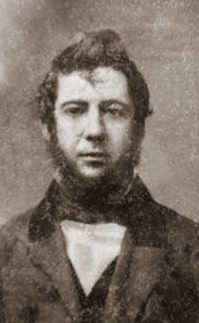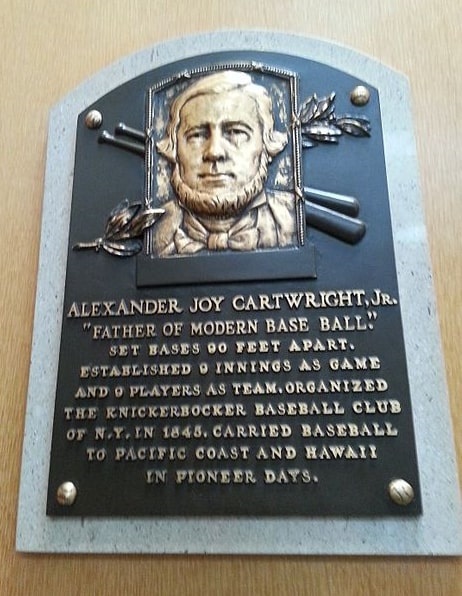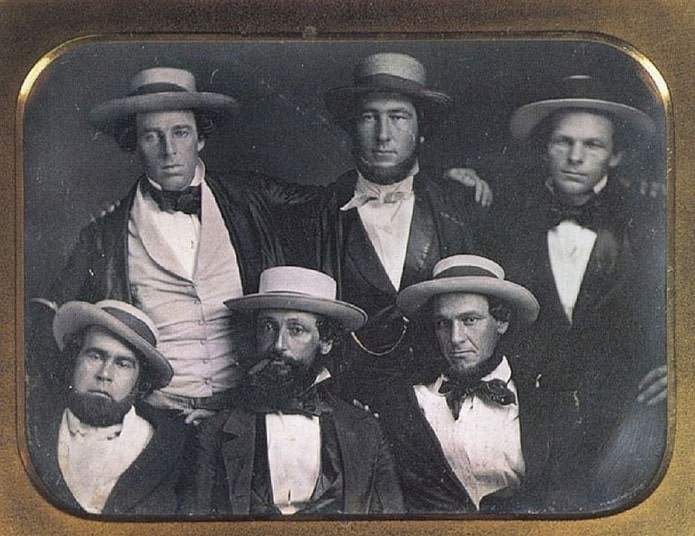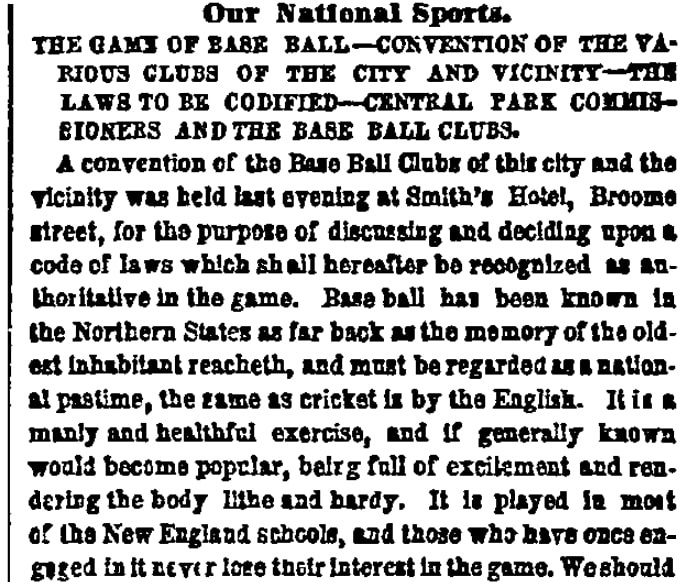Baseball, with origins in the English games of rounders and cricket, is an American innovation long recognized as this country’s national pastime. The popularity of baseball increased right after the Civil War, following the exposure of many soldiers to this relatively new game, but the origins of baseball go much deeper into the 19th century, and perhaps even the 18th century.
A game called “town ball” was played in many parts of the U.S., and the first “modern” baseball club was the Knickerbockers of New York, founded on 23 September 1845.

The Knickerbockers were begun by Alexander Cartwright, a fireman from the Knickerbocker Engine Company No. 12 in New York City. Cartwright published 20 rules for the gentlemen playing in his base ball club to follow; these rules are considered the foundation for modern baseball.

It is an interesting reflection of the times to note that Cartwright insisted that members of his ball club “have the reputation of a gentleman.” In keeping with this, his first rule was: “Members must strictly observe the time agreed upon for exercise, and be punctual in their attendance.” One of the most important modern advances from town ball made by Cartwright’s rules was stopping the practice of throwing the ball at a player to get him out.

The Knickerbocker Base Ball Club was an influential leader in the formation of modern, organized baseball. In 1857, the Knickerbockers held a convention of teams playing baseball in New York to adopt standardized rules they would all abide by, based on Cartwright’s 20 rules. Fourteen teams gathered on 22 January 1857, each sending three delegates to the convention.
One of the Knickerbockers’ delegates, Dr. D. L. Adams, was elected president of the convention and placed in charge of the rules committee. Debates were held, rules hammered out, further meetings scheduled, and organized baseball was off and running. The next year, 25 teams joined together to form the National Association of Base Ball Players.
That important 1857 baseball convention is covered in the following newspaper article. There are several interesting points to consider in this article. For one thing, baseball is called a “national pastime” – and it is only 1857!
Another comment – quite relevant to our own times, when parents lament that children spend so much time indoors playing video games – is the article’s plea for young men to quit indoor pursuits “and seek the open air, the heavy bat and the 6¾ oz. ball,” because it is “a manly and healthful exercise.” The article also predicts that baseball will become “a great national institution.”

Here is a transcription of this article:
Our National Sports.
The Game of Base Ball – Convention of the Various Clubs of the City and Vicinity – The Laws to Be Codified – Central Park Commissioners and the Base Ball Clubs.
A convention of the Base Ball Clubs of this city and the vicinity was held last evening at Smith’s Hotel, Broome street, for the purpose of discussing and deciding upon a code of laws which shall hereafter be recognized as authoritative in the game. Base ball has been known in the Northern States as far back as the memory of the oldest inhabitant reacheth, and must be regarded as a national pastime, the same as cricket is by the English. It is a manly and healthful exercise, and if generally known would become popular, being full of excitement and rendering the body lithe and hardy. It is played in most of the New England schools, and those who have once engaged in it never lose their interest in the game. We should hail it as a favorable omen for the next generation if that bright specimen of humanity, yclept Young New York, would join the base ball clubs and quit his billiards, bar rooms and other unmentionable night amusements, and seek the open air, the heavy bat and the 6¾ oz. ball. We might then hope to be rid of those pale, consumptive five feet three inches attempts at men, which are the making of the tailors and the laughing stock of the women of Broadway.
The Knickerbocker is the oldest base ball club now existing in this city, and seems to be the most influential. The present convention was called by that club, and is composed of three delegates appointed by the various associations. Fourteen separate and independent organizations were represented last evening by the following gentlemen, and it was stated that others would have been present but for distance, or the impossibility of getting home the same night.
Knickerbocker: Messrs. D. L. Adams, Wm. H. Grinnell, L. F. Wadsworth.
Gotham: Messrs. Wm. H. Van Cott, R. H. Cudlip, Geo. H. Franklin.
Eagle: Messrs. W. W. Armfield, A. J. Bixby, John W. Mott.
Empire: Messrs. R. H. Thorn, Walter Scott, Thomas Leavy.
Putnam: Messrs. Thos. F. Jackson, Jas. W. Smith, Edw. A. Walton.
Baltic: Messrs. [illegible], R. G. Cornell, Chas. W. Cooper.
Excelsior: Messrs. Jas. W. Andrews, Jas. Rogers, P. R. Chadwick.
Atlantic: Messrs. C. Sriffen, W. Babcock, T. Tassie.
Harmony: Messrs. R. Justin, Jr., G. M. Phelps, Frank D. Carr.
Harlem: Messrs. E. H. Brown, John L. Riker, C. M. Van Voorhis.
Eckford: Messrs. Chas. M. Welling, Francis Pidgeon, James M. Gray.
Bedford: Messrs. John Constant, Chas. Osborn, Thos. Bagot.
Nassau: Messrs. Wm. P. Howell, J. R. Rosenquest, Eph. Miller.
Continental: Messrs. John Silaby, Nath. B. Law, Jas. B. Brown.
The Convention met together shortly after the hour appointed, and being satisfied with each other’s personal appearance, (justly so, for most of them were splendid looking fellows), the delegates proceeded to elect a President and officers, when the following were appointed:
President: Dr. D. L. Adams, of the Knickerbocker.
Vice Presidents: Reuben H. Cudlip, Gotham; John W. Mott, Eagle.
Secretary: Jas. W. Andrews, Excelsior.
Assistant Secretary: Walter Scott, Empire.
Treasurer: E. H. Brown, Harlem.
After some remarks from the President, a brisk discussion ensued on the motion that a committee of five be appointed to prepare a code of laws which shall be authoritative on the game. An amendment was offered, that twenty should form such committee; and, again, that the Convention should go into Committee of the Whole upon the laws. The various propositions were sweated down to two, and, being put to the vote, it was finally determined that the delegates from each club should appoint one member to sit on said committee. The gentlemen so appointed are as follows:
Committee to Draft a Code of Laws on the Game of Base Ball, to Be Submitted to the Convention: Messrs. L. F. Wadsworth, W. H. Van Cott, W. W. Armfield, Thos. Leavy, Thos. F. Jackson, Dr. Chas. W. Cooper, P. R. Chadwick, T. Tassie, F. D. Carr, E. H. Brown, Francis Pidgeon, John Constant, Wm. P. Howell and Nathanial B. Law. This committee will meet next Wednesday.
Mr. Armfield moved that an assessment of $2 be made from each club, in order to defray incidental expenses, and referred to the proposed Central Park as a most suitable spot for playing matches. Provision had been made there by the Commissioners for the national English pastime of cricket, but none for baseball, and he trusted that this convention would put itself in communication with the authorities on the subject.
Mr. R. G. Cornell submitted three specimen balls of various sizes, 6¼ oz., 6½ oz. and 6¾ oz; the convention will eventually be called upon to decide which is orthodox of the trio.
Mr. Francis Pidgeon proposed that a committee of five be appointed by the Chair to confer with the Central Park Commissioners in relation to a grant of public lands for base ball purposes. This being carried, the Chair named the following:
Committee to Treat with the Commissioners for a Plot of Ground in the Central Park: Francis Pidgeon, E. H. Brown, George H. Franklin, John W. Mott, L. F. Wadsworth.
A motion was then made and carried that each club forthwith pay the Treasurer $2, when that officer remarked, “I shall be under the necessity of notifying that I don’t take Spanish quarters.” The Secretary read over the names of the clubs, the money was forthcoming, and the Convention adjourned at 9½ o’clock until the third Wednesday in February.
Base ball is about becoming [i.e., to become] a great national institution. The gentlemen assembled last evening at Smith’s Hotel were engaged in a work not of that trifling importance which a casual observer might suppose. Mens sana in corpore sano [a healthy mind in a healthy body] is a maxim worthy of notice in this age, when young men are forsaking the fields and outdoor exercise for the fumes of cellars and the dissipation of the gaming table. Let us have base ball clubs organized by the spring all over the country, rivaling in their beneficent effects the games of Roman and Grecian republics. Schoolmasters and clergymen, lend a helping hand.
Note: An online collection of newspapers, such as GenealogyBank’s Historical Newspaper Archives, is not only a great way to learn about the lives of your ancestors – the old newspaper articles also help you understand American history and the times your ancestors lived in, and the news they talked about and read in their local papers.
Related Articles:
